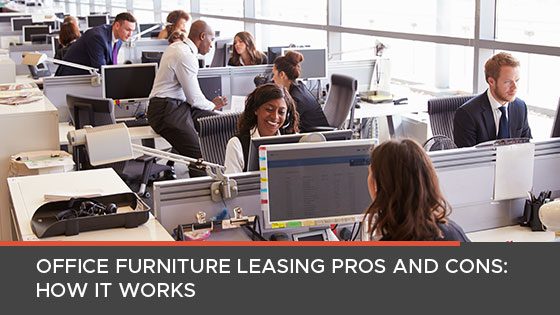If you could acquire new office furniture without significantly impacting your organization’s cash flow, would you do it? This is the promise that office furniture leasing offers businesses that don’t want to purchase furniture outright.
There are many reasons why a business may not want to purchase its office furniture with cash. One of the most obvious situations where this would make sense is when the organization is strapped for cash and would otherwise have to take out a loan for the acquisition.
But there are plenty of other situations where leasing makes sense. Businesses undergoing growth also need fast access to capital while maximizing cash flow for strategic initiatives. In the long run, leasing can offer greater flexibility to businesses without tying up a significant credit line to do so.
When Is Office Furniture Leasing a Good Idea?
Few businesses consider refurnishing their office to be a top-priority, value-generating initiative of its own. There are exceptions to this case, but they are rare. For most businesses, office furniture acquisitions are part of a broader strategic initiative that generates value.
If any of the following six objectives are a priority for your organization, leasing your office furniture could generate significant value.
1. Conservation of Cash
Expanding businesses need cash on-hand to pay for hiring and training new staff, increasing their physical footprint, and all the other costs that snowball when a firm expands. Leasing office furniture lets an organization retain capital while growing earnings.
2. Reducing Debt
Leasing allows a firm to preserve credit lines and conserve access to funding opportunities. By avoiding the assumption of debt, you can mitigate risk while improving the bottom line.
3. Decreasing Tax Burdens
In some jurisdictions and situations, office furniture leasing payments are tax deductible. If you structure your lease agreement with a fair market value buy out, you establish the right to buy the furniture at its fair market rate at the end of the lease.
4. Leasing Without Ownership
A fair market value lease is ideal for furniture because furniture doesn’t become obsolete as computer equipment and electronics do. The higher residual value of the leased asset makes the Fair Market Value lease ideal when you want to lease long-lived assets without owning them.
5. Leasing to Own
You can also structure your lease as a financing loan that gives you the option to purchase the equipment at the end of the contract for $1. The $1 buyout lease lets businesses preserve cash flow during the lease term, finance the eventual ownership of the assets, and avoid debt exposure.
6. Gaining Fixed Payments
Lease payments are protected against market fluctuations. A long-term lease can help to protect you against potential increases in price that could affect your ability to predict operating expenses. This simplifies the process of obtaining furniture that meets your monthly budget.
Drawbacks to Office Furniture Leasing
For some organizations, there are drawbacks to leasing their furniture, and since leasing agreements are, by nature, more complex than strict buyer-seller transactions, these drawbacks can work their way into lease terms unnoticed.
Fine Print
Make sure you are very clear on the terms and conditions of your lease agreement. Talk to your leasing provider to determine who is responsible for repairing broken furniture. Identify whether there are fees associated with prolonged returns or any other unexpected expenses.
Also, be sure to have an in-depth discussion on potential liability – what happens if defective furniture injures an employee?
Buyout Prices
If your eventual aim is to purchase the furniture you plan on leasing; you should be very careful when calculating the final buyout price. Some furniture leasing providers will charge hefty fees for buyouts and structure their agreements strategically so that it’s difficult for you to return the furniture at the end of your lease.
Furniture Quality
Some furniture leasing providers attempt to pass poor-quality furniture off onto their customers, knowing that lessees are less likely to treat their acquisition with the same kind of diligence as a “real purchase.”
They rely on the fact that office managers are reluctant to admit making mistakes and may accept shoddy furniture to avoid having to report less-than-ideal conditions to their superiors.
Lease Your Furniture from a Trustworthy Provider
If you choose to work with a reputable office furniture lease provider, you will protect yourself against most of the drawbacks associated with furniture leases. Trustworthy providers will ensure that wear and tear are appropriately accounted for, that buyout prices are fair, and that the furniture itself is of high quality.
Even if your lease agreement is temporary, you should treat it with the same due diligence you would treat a purchase. If done correctly, leasing office furniture can significantly reduce your companies cash flow exposure while minimizing your risk.
Leasing gives your business the opportunity to acquire high-quality furniture at low monthly rates. Talk to us today to learn more about furniture leasing!
Cory Porteous
Marketing Manager
Office Interiors





